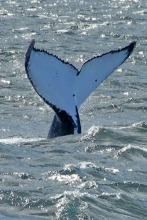The Navy's Super Sonar
Sonar testing harms marine life, but the Navy won't stop
There were a few factual things blended into Animal Planet's "Mermaids: The Body Found" mock-umentary that aired this weekend. One of these is the existence of Navy testing their so-called "super sonar" underwater, to the detriment of marine life. I worry that the mermaids special has done this issue a disservice, and that a lot of people will write it off as being as fictional as the rest of the show.
But super sonar is real, and the Navy refuses to stop it.
Super sonar is just like regular sonar, but a lot louder. Imagine you are standing blindfolded in an empty room. Even without special training, if you clap your hands loudly, you can hear about how big the room is. For example, you would be able to tell if the room is closer in size to a supply closet or an auditorium. Your brain automatically calculates the information, based on how and how fast the echo of the sound returns to your ears.
That's how sonar works: a sound (typically called a "ping") is made, and then its echo is analyzed to create an image of the surrounding objects. Sonar is usually only used underwater, because water communicates sound better than air does. Sound is just a compression wave, exactly like the kind of wave you create when you push at the water in your bath tub.
If regular sonar is like clapping in an empty room, super sonar is like setting off a detonation. It is orders of magnitude louder than regular sonar, which is why the Navy likes it. Super sonar travels farther. It can "see" everything in the ocean for miles around.
Unsurprisingly, marine life is not a fan of the Navy's super sonar. Sound, being a compression wave, ricochets through the body of an animal like a dolphin or a whale, and can cause first-order damage including burst eardrums and hemorrhaging. The noise can also frighten diving whales, who are startled into surfacing too quickly. Whales get "the bends" just like people, and a whale frightened into surfacing in a panic can easily die - or suffer excruciating pain - from the nitrogen bubbles forming in its flesh.
The mermaids special included a real-world event: in 2004 there was a mass beaching on Washington shores, which coincided with one of the Navy's first sonar tests. Other beachings and deaths have been reported coinciding with Navy sonar tests, but the Navy continues to insist that it's just coincidence - and they continue to use their catastrophic sonar.
This is something that has to stop, and I wish Animal Planet had talked about it, instead of using these real-world events to pretend that mermaids exist.
